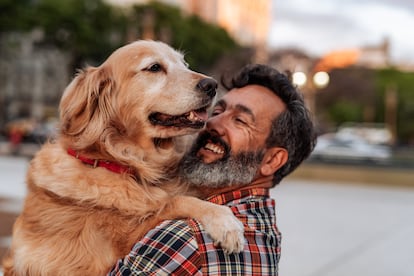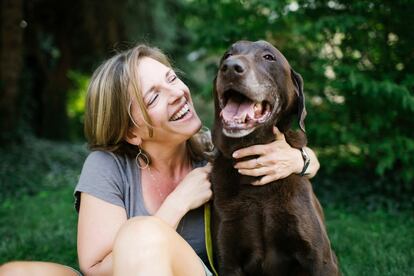How to take care of your aging dog
Canines lose muscle mass as they get older, have lower resistance to infections, and can develop osteoarthritis. To ensure their quality of life, they should eat an age-specific diet, exercise moderately and stay well hydrated

As dogs age, they need specific care to ensure their well-being in their later years. But how do you know when your dog is getting old? Each pet ages differently, with larger dogs reaching old age earlier than smaller breeds. Signs that a dog is in the twilight of its life include graying hair, vision decline and changes in appetite. “On average, large breeds live about 11 to 13 years, while small breeds can live 13 to 16 years,” said Manuel Lázaro, a veterinarian and spokesperson for Madrid’s veterinary association.
Dogs now live longer thanks to better health and nutrition care. Their senior stage starts around the middle-age years and is influenced by various factors. “The dog’s size, breed, gender and physical condition — like if they’re overweight or obese,” are major determinants, said Silvia Miguélez, a pet veterinarian in Madrid.
Canine geriatric syndrome describes older dogs at risk of age-related conditions. “It means a dog is more likely to get sick because its muscles shrink, it’s less able to fight infections, and its heart, kidneys and liver may not work as well. Plus, a dog will feel more tired,” said Lázaro, adding that old age also affects a dog’s coat. “It loses its shine and elasticity, and you might start noticing gray hair around it’s eyes and nose.” Miguélez mentions additional changes in an aging dog related to its mobility and sensory decline. “They get slow and clumsy. They might lose sight, hearing and smell, and even change their food preferences. They could also experience cognitive dysfunction syndrome, similar to Alzheimer’s in humans.”
Old age isn’t a disease, but a stage where the likelihood of certain health issues rises. “Heart disease, kidney and liver disease, tumors, endocrine and locomotor disorders, which are mainly caused by osteoarthritis,” said Lázaro. “The loss of neurons in older dogs causes disorientation, sleep disorders, memory loss and new habits like urinating and defecating inside. They can also develop fears they didn’t have before.”
There are several common causes of death in older dogs. “Chronic kidney failure, heart failure and cancer. In all three cases, weight loss is the first sign that something’s wrong,” said Miguélez.
How to care for an older dog at home

Dog owners can help their furry companions have a high quality of life in their later years. “Pay close attention to symptoms like fatigue, cough, excessive drinking or urination, constipation, and mobility difficulties,” said Lázaro, who recommends doing the following to help prevent health problems in older dogs:
- Opt for a diet low in protein, phosphorus, sodium and calories to support liver, kidney, and heart function.
- Choose one of the “senior” diets tailored to the specific needs of older dogs.
- Include dietary supplements with diverse benefits like antioxidants, fatty acids and vitamins.
- Make sure your dog always has clean water so it drinks plenty.
- Promote weight loss for improved mobility.
- Make sure the animal gets moderate exercise.
- Get the recommended vaccinations to protect your dog’s immune system, especially as it weakens with age.
- Do vet check-ups to catch health issues early.
- Consult an expert about any changes you see in your dog
Why do older dogs eat less?
Elderly dogs eat less due to several age-related factors. “When their taste buds and nose nerves weaken, it can change how food tastes, so they eat less. But some people might think they’re just being picky,” said Miguélez. “They get more sensitive to stressful situations that interrupt their routines. Plus, their brains and hormones go through changes that affect how they naturally regulate food intake.”
Sign up for our weekly newsletter to get more English-language news coverage from EL PAÍS USA Edition
Tu suscripción se está usando en otro dispositivo
¿Quieres añadir otro usuario a tu suscripción?
Si continúas leyendo en este dispositivo, no se podrá leer en el otro.
FlechaTu suscripción se está usando en otro dispositivo y solo puedes acceder a EL PAÍS desde un dispositivo a la vez.
Si quieres compartir tu cuenta, cambia tu suscripción a la modalidad Premium, así podrás añadir otro usuario. Cada uno accederá con su propia cuenta de email, lo que os permitirá personalizar vuestra experiencia en EL PAÍS.
¿Tienes una suscripción de empresa? Accede aquí para contratar más cuentas.
En el caso de no saber quién está usando tu cuenta, te recomendamos cambiar tu contraseña aquí.
Si decides continuar compartiendo tu cuenta, este mensaje se mostrará en tu dispositivo y en el de la otra persona que está usando tu cuenta de forma indefinida, afectando a tu experiencia de lectura. Puedes consultar aquí los términos y condiciones de la suscripción digital.









































